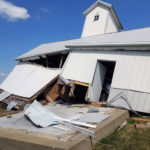For some of us, spring flooding is a nuisance; detours add minutes to our travels to and from work, school, the gym and other activities. But we still have a roof over our head, utilities to keep us comfortable and plenty of food to eat.
What a contrast to communities such as tiny Hamburg, the most southwestern city in Iowa, which was submerged by floodwaters from the Missouri River. The voice of the town’s mayor cracked from emotion as she responded to questions from a CBS This Morning reporter in the midst of the disaster last week.
“We’re little and we’re not wealthy,” she said haltingly. “We’re asking for help. We want to keep our businesses here. We want to keep our homes. We want to keep our citizens here. They’re our people. We’ve known them all our lives.”
Nearly two-thirds of Iowa’s 99 counties have qualified for federal disaster assistance. More may need such help as the snowmelt from the Dakotas and Minnesota empties into the Mississippi and Missouri rivers, according to meteorologists and news reports.
If we consider this unfolding drama from the aspect of Catholic social teaching, what the late Msgr. Marvin Mottet called the “two feet of social action,” our first response must be to provide assistance to people most in need. The second response is to deal with the systemic changes that need to be addressed to prevent or alleviate future devastation.
Back to the first response: Iowa Gov. Kim Reynolds sought and received approval from President Donald Trump for a federal disaster declaration which estimated $1.6 billion in flood damages in the state thus far. (For flood assistance go to www.floods2019.iowa.gov or call 1-800-621-3362 or if using TTY, 1-800-462-7585.)
The declaration triggers federal emergency relief through FEMA, IRS, USDA, the Small Business Administration and other federal programs, Sen. Charles Grassley, R-Iowa, said in his March 22 online newsletter. He’s working with Midwestern lawmakers “to get federal assistance flowing into affected communities.” He’s also introduced legislation “to provide tax relief measures to help affected flood victims, farmers, homeowners, and small businesses recover” and to expand these measures “to the most recent disasters in Iowa.” Constituent specialists in his six state offices are available “to cut red tape for individual Iowans.” (Visit Sen. Grassley’s website at www.grassley.senate.gov)
Another valuable resource is the Iowa Disaster Human Resource Council (IDHRC), which deploys volunteers to supplement the efforts of emergency responders. Visit the website at www.beready.iowa.gov/get_involved/idhrc.html for resources and how to get involved in helping others.
These measures provide some relief for people and businesses that have the wherewithal to complete paperwork and reorganize their lives while waiting for aid to arrive. But what about the families and individuals who don’t earn enough and don’t have savings to tide them over? Who don’t have flood insurance? Who are so overwhelmed that they don’t know where to begin to get help?
Through prayer, volunteerism and our parish social action commissions we can reach out to people living and working on the margins where they are at: low-income apartments and houses; doubled up with family, relatives or strangers; working in the businesses we frequent. Take the risk and ask someone how you might be of assistance. Consider volunteering with the Iowa Disaster Human Resource Council at the website address listed above.
The second response, as mentioned earlier, is systemic. We need to work to bring about change that will prevent or alleviate future disasters. What changes at the county, state and federal level are needed to ensure that homes and businesses don’t locate in flood-prone areas? What changes, if any, are needed in the U.S. Army Corps of Engineers’ management of rivers? How should preparedness be reshaped to account for the possible return of “bomb cyclones” that cause blizzards and spark previously unimaginable flooding? How will we address inequities in assistance, especially to communities of color?
Contact your elected representatives — county, state and federal — to answer these questions. Support solutions that meet the needs, first of all, of the most vulnerable.
Keep informed about legislative issues that impact our use of land, water and air through the Iowa Catholic Conference (www.catholicconference.org) and the U.S. Conference of Catholic Bishops (www.usccb.org).
Spring flooding inevitably requires detours. As followers of the Gospel, our detour should lead us to assist flood victims who are unable help themselves.
Barb Arland-Fye, Editor
(arland-fye@davenportdiocese.org)











